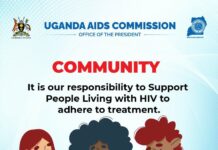By URN
The Uganda Cancer Institute (UCI) has clarified that the notion of men suckling women’s breasts to prevent breast cancer is unsubstantiated and therefore incorrect.
At the Uganda Media Center in Kampala, during the Breast Cancer Awareness Month commemoration, Dr. Naghib Bogere, an oncologist at the Uganda Cancer Institute, debunked the misconception that men suckling women’s breasts can reduce breast cancer risk, calling it entirely inaccurate.
According to Dr. Bogere, such misconceptions can deter women from seeking timely breast cancer check-ups, despite lacking scientific evidence. He emphasized that breastfeeding by a child is the proven way to reduce breast cancer risk.
“We know that breastfeeding is one of the preventive measures of breast cancer, the longer you breastfeed, the lower the likelihood of breast cancer, and usually the benefit is recorded when you breastfeed for at least a year.” said.
He added: “Whenever you breastfeed, the cells in your breasts mature, and when they mature and fully develop, chances of cancer forming in those cells are lower, but these changes cannot happen if your husband is only sucking at your breasts,” Bogere noted.
He, however, called on men to encourage their wives to examine their breasts monthly and offer support throughout treatment, noting that the chances of healing are 90% if breast cancer is detected in its early stages.
The Uganda Cancer Institute also warned that breast cancer isn’t exclusive to women, as men can also be affected, although women are more likely to develop the disease. Dr. Bogere noted that approximately 1 in 25 breast cancer patients is a man.
“If we examine 100 patients, it means we’ll get 4 men with breast cancer,” Bogere asserted. “The challenge we have with men is that they think breasts are female organs and don’t know they can get the disease. So, the message is: men also have breasts, men can also get breast cancer. Men should screen their breasts for any changes, examine themselves for lumps, and visit the cancer institute if they notice anything unusual.”
Dr. Alfred Jatho announced that during the community engagement and awareness month, they plan to conduct several activities, including organizing health camps for screening, conducting surgeries in various districts, and offering free screening at all district health facilities across Uganda’s regions until the end of October.
But the Executive Director of the Uganda Cancer Institute, Dr. Jackson Orem, emphasized that breast cancer remains the leading cancer among women in Uganda, accounting for a large proportion of all female cancers treated at UCI.
He said that each year, Uganda records over 4,000 new breast cancer cases, with many women presenting with advanced-stage disease. However, with early detection and timely treatment, up to 90% of breast cancers are curable.
According to the Uganda Cancer Institute, breast cancer continues to affect women at younger ages, with many cases reported among women between 30 and 50 years old. Late presentation remains a significant challenge, with nearly 80% of patients diagnosed at advanced stages.



